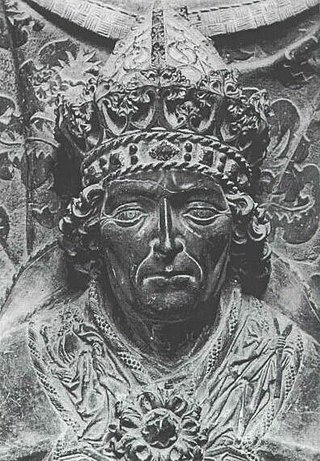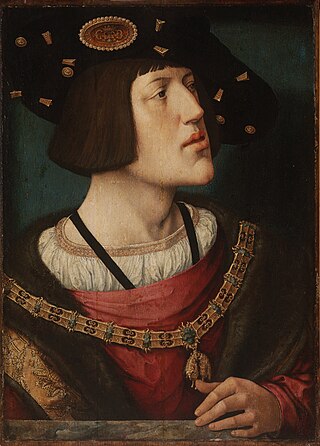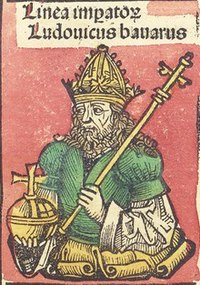
John the Blind or John of Luxembourg, was the Count of Luxembourg from 1313 and King of Bohemia from 1310 and titular King of Poland. He is well known for having died while fighting in the Battle of Crécy at age 50, after having been blind for a decade. In his home country of Luxembourg, he is considered a national hero. Comparatively, in the Czech Republic, Jan Lucemburský is often recognized for his role as the father of Charles IV, Holy Roman Emperor, one of the more significant Kings of Bohemia and one of the leading Holy Roman Emperors.

Louis IV, called the Bavarian, was King of the Romans from 1314, King of Italy from 1327, and Holy Roman Emperor from 1328 until his death in 1347.

The Holy Roman Emperor, originally and officially the Emperor of the Romans during the Middle Ages, and also known as the Romano-German Emperor since the early modern period, was the ruler and head of state of the Holy Roman Empire. The title was held in conjunction with the title of King of Italy from the 8th to the 16th century, and, almost without interruption, with the title of King of Germany throughout the 12th to 18th centuries.

Frederick the Fair or the Handsome, from the House of Habsburg, was the duke of Austria and Styria from 1308 as well as the anti-king of Germany from 1314 until 1325 and then co-king until his death.

The House of Luxembourg or Luxembourg dynasty was a royal family of the Holy Roman Empire in the Late Middle Ages, whose members between 1308 and 1437 ruled as kings of Germany and Holy Roman emperors as well as kings of Bohemia, Hungary and Croatia. Their rule was twice interrupted by the rival House of Wittelsbach. The family takes its name from its ancestral county of Luxembourg which they continued to hold.

Rudolf I of Bavaria, called "the Stammerer", a member of the Wittelsbach dynasty, was Duke of Upper Bavaria and Count Palatine of the Rhine from 1294 until 1317.

The Battle of Mühldorf was fought near Mühldorf am Inn on September 28, 1322 between the Duchy of (Upper) Bavaria and Austria. The Bavarians were led by the German king Louis of Wittelsbach, while the Austrians were under the command of his cousin, the anti-king Frederick of Habsburg.

The Declaration of Rhens or Treaty of Rhens was a decree or Kurverein of the Prince-electors of the Holy Roman Empire issued in 1338 and initiated by Baldwin of Luxembourg, the Archbishop of Trier and brother of the late Emperor Henry VII.

The Duchy of Saxe-Wittenberg was a medieval duchy of the Holy Roman Empire centered at Wittenberg, which emerged after the dissolution of the stem duchy of Saxony. The Ascanian dukes prevailed in obtaining the Saxon electoral dignity until their duchy was finally elevated to the Electorate of Saxony by the Golden Bull of 1356.

Peter of Aspelt was Archbishop of Mainz from 1306 to 1320, and an influential political figure of the period. He brought the archbishopric to its peak of power.

Rudolf I, a member of the House of Ascania, was Duke of Saxe-Wittenberg from 1298 until his death. By the Golden Bull of 1356 he was acknowledged as Elector of Saxony.
In the Holy Roman Empire, the Great Interregnum was a period of time, from approximately 1254 until 1273, following the throne dispute of Frederick II where the succession of the Holy Roman Empire was contested and fought over between pro- and anti-Hohenstaufen factions. Starting around 1250 with the death of Frederick II, the conflict over who was the rightful emperor and King of the Romans would continue into the 1300s until Charles IV of Luxembourg was elected emperor and secured succession for his son Wenceslaus. This period saw a multitude of emperors and kings be elected or propped up by rival factions and princes, with many kings and emperors having short reigns or reigns that became heavily contested by rival claimants.
In the years 1410 and 1411 saw three royal elections in the Holy Roman Empire. The elections were prompted by the death of previous King Rupert in 1410 and, after two contested elections in 1410, resulted in Sigismund of Hungary being recognized as the new king in 1411.

The imperial election of 1440 was an imperial election held to select the emperor of the Holy Roman Empire. It took place in Frankfurt on February 2.

The imperial election of 1519 was an imperial election held to select the emperor of the Holy Roman Empire. It took place in Frankfurt on the 28th of June.
An imperial election was held in Cologne on 5 January 1531 to select the King of the Romans of the Holy Roman Empire. As the current emperor, Charles V, had not yet died nor abdicated, this election was conducted so as to determine his successor.
The imperial election of 1658 was an imperial election held to select the emperor of the Holy Roman Empire. It took place in Frankfurt on July 18.

The imperial election of 1742 was an imperial election held to select the emperor of the Holy Roman Empire. It took place in Frankfurt on January 24. The result was the election of Charles Albert of Bavaria, the first non-Habsburg emperor in three hundred years.

The imperial election of 1273 was an imperial election held to select the emperor of the Holy Roman Empire. It took place in Frankfurt on October 1.

The imperial election of 19 October 1314 was an imperial election held to select the emperor of the Holy Roman Empire. It took place in Sachsenhausen, near Frankfurt.















